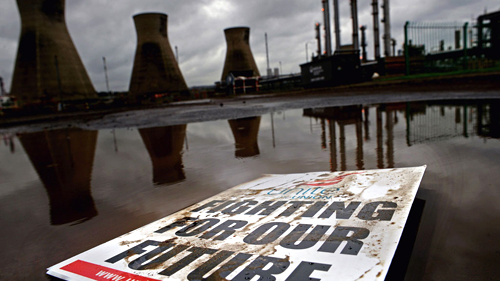
The capitulation of Unite the Union at the Grangemouth petrochemical refinery demonstrates how unable even a powerful and wealthy union it to defend workers’ conditions. After a two-day lock-out, workers at the refinery accepted a plan to savagely reduce their conditions. Justifying what happened, General Secretary Len McCluskey wrote in the Guardian that ‘Unite has reached an agreement with the owner, Ineos, which will guarantee the future of skilled and well-paid work at Grangemouth well into the future…That is what trade unions do’. Well-paid work at Grangemouth meant an average salary double the average wage. The fact is, however, that it was a major defeat, and will open the door to even more attacks on trade union rights.
Before the lock-out, Jim Ratcliffe, billionaire boss of Ineos which owns the refinery and plant in central Scotland, heralded an offensive when complained that he and his entrepreneurial kind were restricted in their profitability by union organisation. On cue, the management presented a ‘survival plan’ to the plant’s 1,370 workers which involved pay freezes, an end to final salary pensions, the end of full-time union convenors on site, and no strikes for three years. On Wednesday 23 October the majority of Unite union members at Grangemouth voted to reject it, although a minority had already accepted a deal with a £15,000 cash inducement. Ineos responded by shutting down the plant and locking them out together with 2,000 sub-contractors. Two days later the workers and their union capitulated and accepted the plan in return for keeping their jobs. McCluskey said he understood Ineos’ difficult position as ‘employers during the current banking slump, working to keep jobs alive while adapting to the position some companies find themselves in.’
That the social democratic left live in a fantasy world was evident from their comments on the defeat. On the one hand, the Morning Star portrayed it as a victory: ‘Grangemouth’s workers have called bully-boy Ineos bosses’ bluff by saying they are willing to accept cuts if owners back down on a brutal closure threat.’ On the other hand, Socialist Worker accepted the agreement as a defeat, but then ignored what had actually happened and argued that: ‘What was needed was to occupy the plant instead of being held to ransom.’ As the lockout started, the Socialist Party said ‘Unless Ineos bosses back down, this dispute could explode into a struggle like the UCS struggle in the 1970s. The organised strength of the entire labour and trade union movement needs to be mobilised to ensure the union-busting, profiteering tactics of Ineos and its billionaire majority owner are defeated.’ As unlikely a scenario as Socialist Worker’s concluding advice that: ‘Union leaders need to build a fight instead of accepting attacks if we are to avoid more Grangemouths.’
Grangemouth showed the inadequacy of a trade union-based strategy to defeat austerity. Only a struggle with active community-wide support could have stopped Ineos – and there was no time to develop it. The social democratic left sticks its head in the sand when it says that there can be no serious struggle unless it is led by the trade unions. It ignores the lessons of the miners’ strike, the last major act of serious resistance by a trade union. That the miners were able to continue their struggle for over a year despite the opposition of both the Labour Party and the TUC was down to the support from the women’s support groups and community-based organisations around the country. The National Union of Mineworkers went out to the people and took the struggle beyond the ranks of the union. That is a lesson that the social democratic left in practice ignores. The mass of the working class is outside of the trade unions and faces low wages, insecure employment and serious attacks on social welfare. In the face of this real class war new forms of organisation, solidarity and resistance must emerge.
Michael MacGregor




